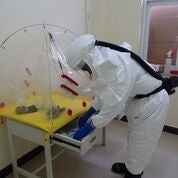Doctors at the University of Massachusetts Medical School (UMMS) were entrenched in the Liberian health system long before the historic Ebola Virus outbreak that came to a frightening head last year.
The Worcester medical school had been working in that country to strengthen medical education and infrastructure since 2006, after the system had been ravaged by civil war that ended a few years earlier.
And now that the Ebola crisis has ended (though health care workers are ever-vigilant for new cases) a UMMS-led coalition of medical schools from the U.S. and Ethiopia is setting sights beyond the prevention of just Ebola, to include outbreaks of other diseases in the developing country as well.
According to Dr. Katherine Luzuriaga, the UMMS physician who has helped lead the charge in securing funding to help rebuild the Liberian health care system in the wake of the Ebola outbreak, a $20-million grant from the U.S. Centers for Disease Control announced this week will take disease prevention efforts much deeper, with a focus on other diseases that, like Ebola, cause hemorrhagic fever, as well as common illnesses such as the measles.
“Everybody’s hope is that while the Ebola crisis was just a real tragedy, things like the CDC grant will be used to build the system back,” Luzuriaga said.
Luzuriaga and dozens of other UMMS physicians have spent time on the ground in Liberia since the Paul G. Allen Family Foundation awarded a $7.5 million grant last fall, which enabled them to respond to the Ebola crisis with necessary equipment and training of Liberian health care workers. Much of the work involved getting hospitals reopened to service the population in need of routine medical care unrelated to Ebola. Most hospitals were shut down during the height of the outbreak, as health care personnel did not feel they had the means to treat patients safely.
By January, the number of new cases had slowed significantly, and by mid-year, new cases of Ebola had ceased, Luzuriaga said. Relief efforts had finally taken hold, after Liberian leaders the previous summer had lambasted economically-advantaged countries for a slow international response to the outbreak.
Given the longtime ties UMMS had to Liberia, Luzuriaga said it was heartbreaking to see how the Ebola outbreak had knocked the maturing health care system down. The country’s only medical school had closed after faculty had left, or in some cases, died of Ebola.
Luzuriago said a lot has changed over the last year. The Dogliotti College of Medicine in Monrova, the capital, has reopened, for one example.
Armed with $20 million, the UMMS-led coalition known as the Academic Consortium Combatting Ebola in Liberia (ACCEL) will now work to avoid a similar crisis. The CDC grant will pay for a host of efforts, including training of health care workers to prevent infection; sustainable planning for personal protection equipment supply; expanding public health laboratory systems and hospital diagnostic services to ensure rapid identification of Ebola and other diseases contagions (Ebola diagnostics are currently performed in one location); and strengthening blood collection and transfusion practices to safeguard against the spread of infectious disease through the blood supply.
“The focus is on preparing the health system and the country to prevent outbreaks but should an outbreak occur, to make sure it’s contained,” Luzuriaga said.

